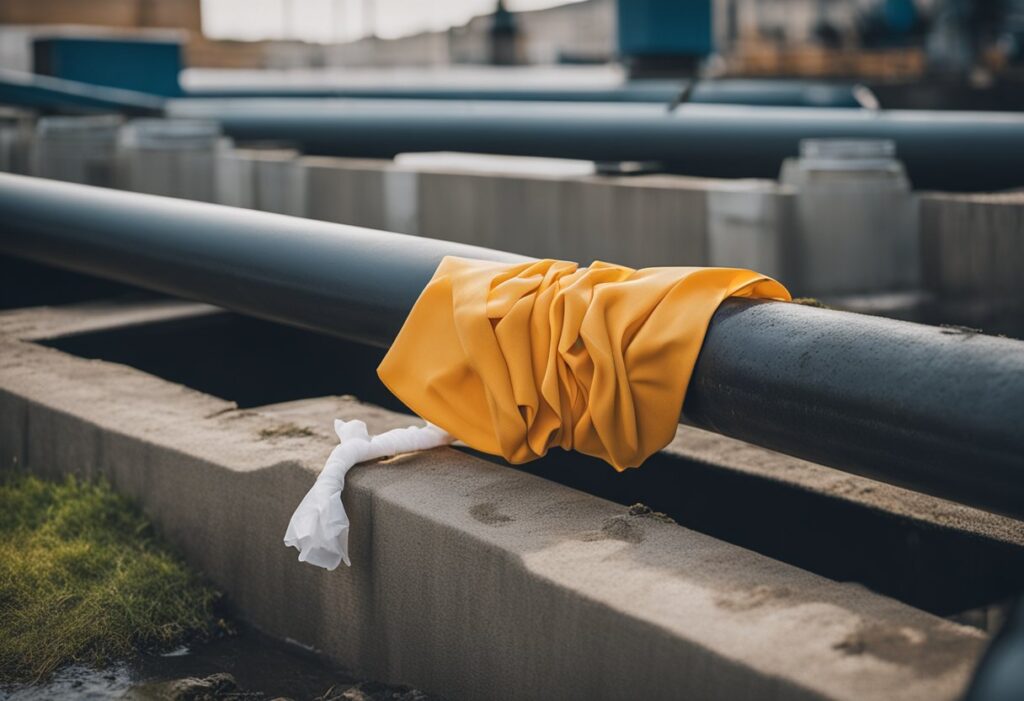
Sewer gas can be a highly unpleasant and even hazardous issue that can strike during home renovations, particularly when working with plumbing fixtures. One common concern is whether a simple rag can effectively stop sewer gas from entering a living space.
A rag is sometimes used as a temporary solution for plugging the embedded openings and pipes in the household, like a toilet or shower drain, to prevent sewer gas from seeping inside. However, this method has its limitations, as rags can sometimes slip into the pipe or fail to create a proper seal.
Is a rag a safe and effective way to stop sewer gas?
Utilizing a rag as a means to block sewer gas might seem like a quick and easy solution. But reality is not that simple. You have to consider how effective and secure they are gonna be
Effectiveness
A rag, when stuffed into a drain or pipe, might initially block some of the sewer gas from escaping. However, it is not meant to be a long-term or foolproof fix. Sewer gas can still find its way through the fibers of the rag, reducing its effectiveness over time. Additionally, the rag could become dislodged or be insufficient to seal any gaps or openings effectively. On the other hand, methods such as P-traps and vent pipes are specially designed to ensure the sewer gas is trapped and expelled safely.
- Pros:
- Quick and easy solution
- Can temporarily reduce the smell
- Cons:
- Not a long-term or foolproof fix
- Sewer gas can still leak through the fibers
- Could become dislodged or ineffective in sealing gaps
Safety
Sewer gas contains toxic and flammable components, such as methane and hydrogen sulfide. Relying on a rag to block these fumes is not a safe practice. Over time, the integrity of the rag may diminish, allowing toxic fumes to enter the living space. This poses both health risks and fire hazards. In contrast, properly installed and maintained plumbing systems incorporate mechanisms that are specifically designed to manage sewer gas safely.
What are the risks of using a rag to stop sewer gas?
Using a rag to block sewer gas temporarily might seem quick, but there are risks to consider. Here are some concerns:
- Ineffectiveness: A rag isn’t airtight, so harmful sewer gases can still get in, even if it blocks the smell temporarily. It’s not a guaranteed long-term solution.
- Moisture buildup: Rags can become damp over time, promoting mold and mildew growth. This could pose health risks.
- Potential blockage: Depending on how the rag is placed and the pipe’s size, it might slip into the drainage system, causing a blockage and sewage backups.
What is the Best Way to Stop Sewer Gas Permanently?
Vent Pipes
One effective method to stop sewer gas from entering your home is ensuring proper ventilation. Vent pipes play a key role in allowing sewer gases to escape while maintaining the right air pressure in your drainpipes. Make sure your vent pipes are free from obstructions like debris, ice, or bird nests. Also, they should extend above the roofline to prevent gases from coming back indoors. If the issue persists, call a plumber to inspect and fix any vent pipe problems.
P-Traps Installation
To keep sewer gases at bay, installing P-traps under sinks, showers, and other drain outlets is essential. A P-trap is a curved section of pipe filled with water that acts as a barrier between your home and the sewer system. Regularly inspect your P-traps for leaks or improper installation to maintain their effectiveness.
Here are some quick tips on P-trap maintenance:
- Check for leaks or standing water below P-traps.
- Ensure proper water seals are present to block gases.
- Replace damaged or corroded P-traps as necessary.
Drain Maintenance
Proper drain maintenance is another crucial factor in preventing sewer gas odors. Keep all drains clean and unclogged to avoid buildup of debris, which can lead to unpleasant smells.
Some simple methods to maintain drains include:
- Regular cleaning: Remove hair, food particles, and other debris regularly.
- Chemical-free solutions: Use baking soda and vinegar to clear minor clogs and odors.
- Hot water flush: Run hot water through drains periodically to eliminate buildup.
For more persistent issues, consider using a small drain snake or even hiring a professional plumber to clear and maintain your drains.

Leave a Reply